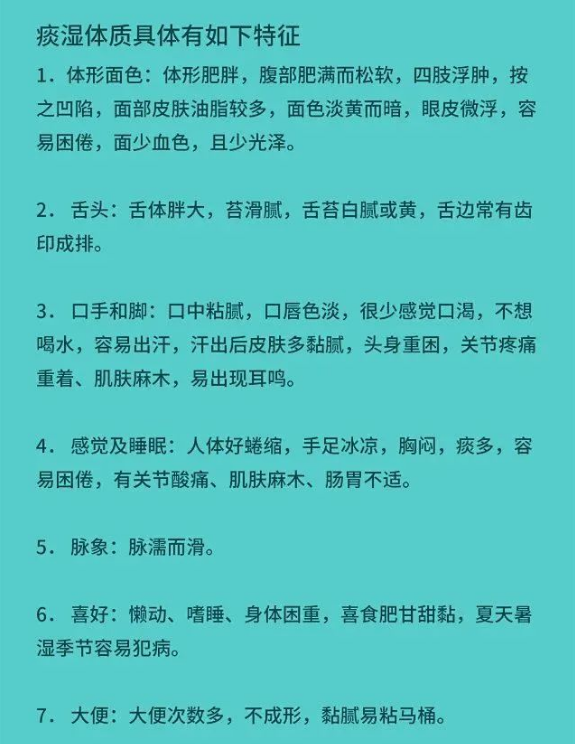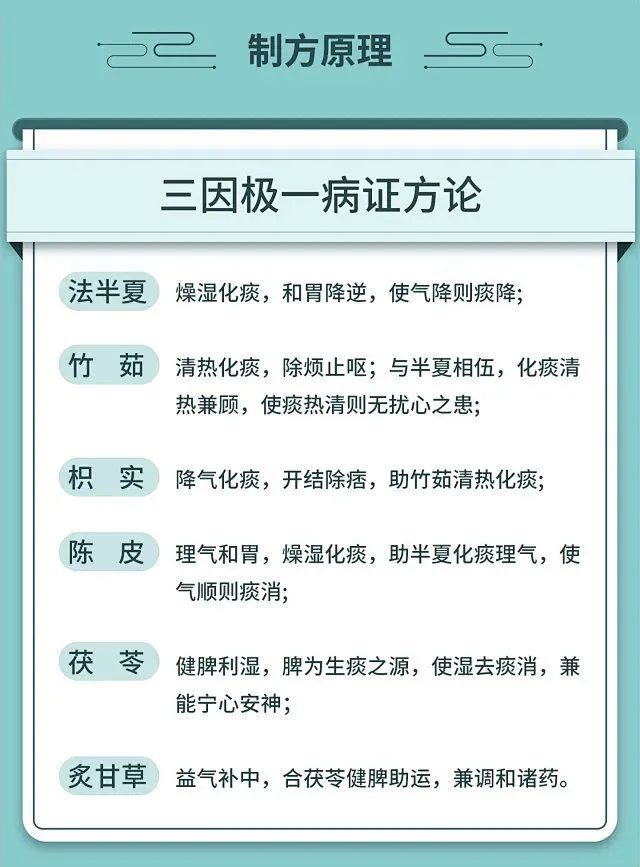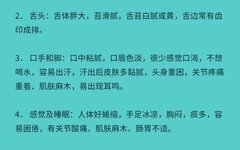Today, I would like to share an ancient formula, known as the “First Formula for Eliminating Phlegm and Dampness,” which sweeps away all phlegm and dampness from the body, helping you stay away from high blood pressure, obesity, and insomnia. Let’s take a closer look!Our common “three highs” refer to high blood sugar, high blood lipids, and high blood pressure. Ultimately, these conditions stem from an excess of phlegm and dampness in the body. Some people often suffer from insomnia, tossing and turning at night due to an unsettled mind. Others struggle to lose weight, also due to excessive phlegm and dampness, which causes fluids to accumulate in the body. If you know how to eliminate phlegm and dampness, many ailments can be resolved.
Wen Dan Tang (Warm Gallbladder Decoction) is truly a miraculous remedy.
What exactly is Wen Dan Tang?
It is simple: Fu Ling (Poria) 30g, Ban Xia (Pinellia) 6g, Zhi Shi (Bitter Orange) 6g, Zhi Gan Cao (Honey-Fried Licorice) 6g, Chen Pi (Dried Tangerine Peel) 6g, Zhu Ru (Bamboo Shavings) 6g.
These six ingredients are all common items, none of which are expensive medicinal herbs. However, when combined, they can produce miraculous effects.
Clinical practice has shown that Wen Dan Tang can treat over 100 different conditions, including some peculiar ailments. However, it cannot be said that Wen Dan Tang can cure all diseases; rather, it is because many ailments are caused by phlegm and dampness, and Wen Dan Tang is precisely designed to treat phlegm and dampness. By resolving phlegm and dampness, it also alleviates various related symptoms.
Traditional Chinese Medicine emphasizes treating symptoms according to their causes. Once the pathogenesis is identified, the treatment direction is clear. Phlegm-dampness constitution can be treated with Wen Dan Tang.
Note that the term “phlegm” here does not refer to the common understanding of phlegm, but rather to the pathological accumulation of body fluids; “dampness” refers to the dysfunction of the digestive system, leading to uncontrolled fluid movement within the body, resulting in internal dampness.
In simple terms, phlegm and dampness refer to an accumulation of excess fluids in the body that cannot be metabolized normally.
Modern lifestyles often contribute to poor habits, such as consuming cold drinks and ice beer, relying on air conditioning and fans, and staying up late. These unhealthy habits lead to a phlegm-dampness constitution in most people, resulting in various health issues.
Traditional Chinese Medicine has summarized many characteristics of phlegm-dampness constitution:

“Phlegm and dampness cause strange diseases”; “Phlegm is the mother of all diseases”;“Dampness is the root of all evils”. Many inexplicable diseases are actually caused by phlegm and dampness. Wen Dan Tang can treat phlegm and dampness, so using Wen Dan Tang for foot baths can alleviate many ailments.
In Dr. Luo Dalun’s book, “Tongue Diagnosis,” the formula for Wen Dan Tang is publicly disclosed—
Wen Dan Tang: Fu Ling (Poria) 30g, Ban Xia (Pinellia) 6g, Zhi Shi (Bitter Orange) 6g, Zhi Gan Cao (Honey-Fried Licorice) 6g, Chen Pi (Dried Tangerine Peel) 6g, Zhu Ru (Bamboo Shavings) 6g.
The main functions of Wen Dan Tang are to eliminate dampness, transform phlegm, and relieve greasiness. The monarch herb in this formula is Fu Ling, which strengthens the spleen and promotes dampness elimination; a healthy spleen leads to phlegm resolution (“The spleen is the source of phlegm“) and promotes dampness removal.

Dr. Luo Dalun also introduced the method for using Wen Dan Tang for foot baths: Boil the above herbs in water, bring to a boil over high heat, then simmer for 30 minutes. Strain the decoction, then divide it into two portions, adding it to warm water for foot baths in the morning and evening. The water temperature should not be too hot, just enough to cover the tops of the feet, and soak for about 25 minutes.
Wen Dan Tang is generally used for foot baths. It is not that the decoction cannot be consumed, but rather that the effects are better when used for soaking.Because individuals with heavy phlegm and dampness often have spleen deficiency, absorption is poor. The rich meridians in the soles of the feet allow for better absorption of the medicinal properties, leading to quicker results.The herbs for Wen Dan Tang are generally available at pharmacies.
► Wen Dan Tang can also help with: including athlete’s foot, insomnia, dysmenorrhea, eczema, rhinitis, psoriasis, tic disorders, cholecystitis, schizophrenia, stubborn cough, hair loss, and many other conditions have shown good results in clinical practice.
1. Symptoms of phlegm and dampnessBody tends to be overweight, limbs are swollen, oily complexion, dull complexion, slippery and greasy tongue coating, cold hands and feet, excessive sleepiness, frequent bowel movements, chest tightness, easy sweating, joint pain, and excessive phlegm.2. Symptoms of damp-heatFrequent loose stools, diarrhea, or constipation, thick and greasy tongue coating, serrated edges of the tongue; fatigue and weakness, drowsiness; sensitivity to both cold and heat; dry mouth, bitter taste, bad breath; excessive phlegm, cough; oily hair, hair loss; swelling, drooping eye bags; lower back pain and joint pain; chest tightness; dark circles; dizziness and lack of energy; dampness in the genital area; dampness in the scrotum; facial blemishes, acne, oily skin; abnormal vaginal discharge with odor and itching; oily skin, eczema, etc.3. Symptoms of cold dampnessWhite, green, dark, or black complexion; recurrent oral ulcers, coughing up thin white phlegm; clear runny nose, cold sweat, frequent sneezing (especially in the morning, sneezing continuously when exposed to wind); prone to abdominal pain and diarrhea; acne and blemishes on the face (soaking Wen Dan Tang with ginger for foot baths).Finally, who is most suitable for Wen Dan Tang:Individuals with phlegm-dampness, damp-heat, damp-cold, and qi stagnation are all suitable:1. Those with poor sleep (especially those with liver-gallbladder disharmony and excessive phlegm, particularly noticeable during seasonal changes).2. Individuals with a damp and phlegm constitution (those who appear plump and pale, with a soft and full abdomen, and gain weight easily from drinking water).3. Individuals with a bad temper (as Wen Dan Tang clears liver-gallbladder heat. After soaking the feet, massaging the Tai Chong point will enhance the effect).4. Individuals with liver qi stagnation, who often feel low (soaking promotes yang, moves qi, and invigorates blood; soaking until slightly sweaty can gradually improve mood).5. Individuals with a yellow greasy tongue (a yellow tongue indicates heat, and the thicker the coating, the heavier the dampness) / white greasy tongue indicates cold dampness.6. Individuals with oily faces and acne; prone to sweating with a sweaty odor, and feel cool after sweating. Those with heat above and cold below.7. Individuals with the three highs (those with phlegm-dampness have thick and sticky blood; good diet but little exercise, making them essential for those with the three highs). Note: Hypertensive patients are advised to consult a physician before use.8. Lazy individuals who enjoy sweet foods and tend to lie down after meals.9. Those with frequent indigestion, belching, and sour stomach, and bad breath due to stomach heat.
10. Individuals with nodules or lipomas.
Precautions:1. The water level for foot baths should be suitable for the San Yin Jiao point.2. The water temperature should be within a comfortable range; slightly higher temperatures yield better results.3. Soaking time should be over 20 minutes; considering the cooling of water, it is advisable to reserve some water to gradually add during soaking to maintain temperature.4. The container for decocting the herbs should preferably be porcelain; stainless steel or aluminum pots can be used, but avoid iron pots.5. A single batch of herbs can be decocted twice. If conditions allow, foot baths can be done twice a day; if not, once a day is sufficient.6. If symptoms such as gas, belching, or flatulence occur after soaking, these are signs of the body expelling illness and are positive reactions.7. How many days is appropriate for soaking? Generally, a course of treatment requires 7 batches of herbs, and foot baths should last at least 10 days, but this depends on individual feelings. Since the goal is to eliminate phlegm and dampness, it is advisable to avoid sticky, phlegm-producing, and damp-inducing foods during the soaking period. Cold and raw foods should also be avoided.Precautions for foot bath users:1. Because the formula contains Zhi Shi (Bitter Orange), which breaks qi, pregnant women should not use this formula.2. This formula has a qi-reducing effect, so it is not recommended for individuals with severe qi deficiency. If symptoms of qi deficiency occur during soaking, one can take Sheng Mai Yin or Bu Zhong Yi Qi Wan to boost qi.3. Diabetic patients may experience numbness in the feet and may not be sensitive to water temperature, so they should be particularly cautious in adjusting the water temperature before soaking.4. Children under six years old are not recommended to use this formula for foot baths.
Aside from these groups, others can use foot baths. It is permissible during menstruation and colds; a large pot of water can be prepared for the whole family to soak together.
If you also belong to the phlegm-dampness constitution, consider using it for conditioning, but it should only be used under the guidance of a professional physician.
Copyright Notice: Source: Voice of Traditional Chinese Medicine. The content and images in this article are sourced from the internet. This platform focuses on communication and sharing, not for commercial use. If there is any infringement, please contact the editor for deletion. Please indicate the source when reprinting this article.

